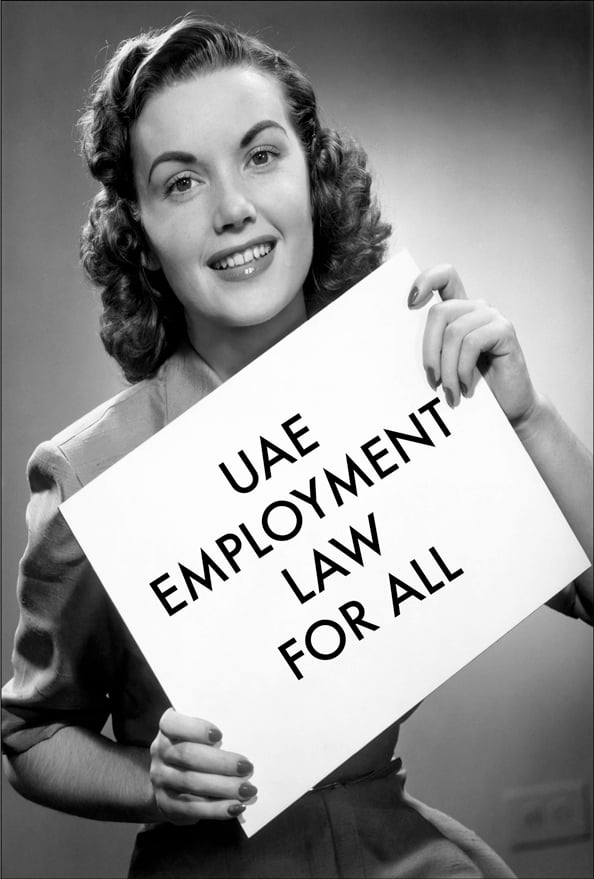Thousands of expats come to the UAE for attractive, tax-free wages and a life in the sun. And despite what many say, you’re more protected as an employee in the Emirates than you think.
Most recently the government revealed it will be implementing a new law that ensures UAE workers are paid on time. The new decree from the Ministry of Human Resources and Emiratisation came into effect this October 3.
Not sure what your rights are? Here’s a comprehensive guide to what’s what of employment law in the UAE.
Getting paid late
If a company with over 100 employees fails to pay their employees within a period not exceeding 10 days, then the ministry will stop granting them any additional work permits starting from the 16th day of delay.
If a company fails to pay their employees for over a month, the Ministry of Human Resources and Emiratisation will step in to halt all other companies owned by the same employer, as well as forbid any upcoming projects foreseen by the same owners.
If a company continues to refrain from paying wages, the Ministry will take necessary measures to use the company’s bank guarantee as well as downgrade the business to a third category company.
After two months, if wages have still not been paid then administrative fines will follow in addition to registered fines.
Administrative fines reach Dhs5,000 per worker’s delayed wage, stretching to a maximum of Dhs50,000 in events which include multiple workers protesting about unpaid wages.
For companies with under 100 employees, they can face bans on work permits, to fines and court referrals. However, these consequences will only be faced if the company fails to pay wages within 60 days.
If the company is a repeat violator, then the Ministry will apply the same penalties as are given to companies with more than 100 employees.
Leaving Before The End Of Your Contract
It is a myth, for example, that a boss can refuse to allow his or her employee to leave their company. “You may change jobs at any time,” assures Nita Maru, of TWS Legal Consultants.
However there may be, Maru adds, financial consequences for those who do not serve the UAE’s legal notice period of 30 days. Gratuities, a key component of the attractiveness of Emirati employment, may be reduced, or cut.
“Your employer may not deduct amounts owing to you pursuant to your gratuity,” says Maru. “However, the employer is entitled to deduct from your gratuity, anything which you as an employee are owing to the company.”
“Your employment contract would outline what you and your employer have agreed to once it comes to items which the employee is responsible for,” she adds. “For example, the cost of phone bills, or some other benefits, may be the financial responsibility of the employee. The contract will have to be reviewed in these cases.”
“If an employee departs from his employment without providing the appropriate notice, then that employee shall not receive their gratuity,” adds Maru. “There are, of course, situations wherein an employee may leave without notice, which are limited to circumstances where an employer has breached his duties to an employee or assaulted an employee. In practice, such violations are difficult to prove and therefore we recommend that 30 days’ notice always be provided.”
Gratuities
A general rule is that gratuities will be granted on the basis of the length of employment. For example, if you work somewhere for a year, you may receive 21 days of pay for each year of service up to five years. From then on you will receive 30 days’ pay for each additional five years. The UAE does not account for those who have worked for under a year.
Regarding limited contracts, if the employee leaves voluntarily there is no entitlement to a gratuity. Otherwise, a limited-contract employee’s gratuity is reduced by one-third of an unlimited employee’s.
“An employee resigning with five years service is entitled to full gratuity,” says Sarah Khoja, of Clyde & Co. “Employees on fixed term contracts should normally accrue five years service before being able to resign and still receive gratuity. There is no reduction in gratuity under DIFC employment law if an employee resigns employment whether on a fixed term or unlimited term contract and regardless of the length of service.”
Gratuity is always payable including when an employee is made redundant. The only circumstances in which it is not payable is if the employee is terminated by DIFC for gross misconduct.
Related Story: Property Law In The UAE – What You Need To Know
Related Story: Maternity Law In The UAE – Everything You Need To Know
Holidays
Holidays law is very simple. An employee is entitled to a minimum of two calendar days per month, once completing six months of service. This figure raises to 30 days per year, for those who have completed more than a year of employment. This does not include public holidays, which can vary based on the lunar calendar.
Overtime
Overtime law is also fairly clear-cut, though, of course, bringing up disputes with an employer for working beyond hours is a delicate issue. According to local law ‘overtime’ constitutes any hours in excess of ‘normal hours’, depending on your normal working day.
An employee should not be expected to put in more than two hours of overtime, unless those hours are needed to prevent ‘substantial loss or accident’. “Where overtime hours are worked, eligible employees should receive an uplift on the rate of pay. The uplift varies according to the time of day during which the overtime hours were worked,” says Jamie Liddington of Hadef & Partners.
If the employee’s ‘normal hours’ are between 9pm and 4am overtime will be 150 per cent of the normal wage, whereas that figure drops to 125 per cent for all other normal working hours. Importantly, overtime is not granted to managers in a supervisory position over other employees. Should an employee feel that he or she is being taken advantage of by their company, they can open a claim for unpaid wages with the Ministry of Labor.
Related Story: Know Your Rights In The UAE
Read: How To Get Ahead In Your Career In Dubai

Be business-savvy and know your employment rights in the UAE
Redundancy
The thorniest, and cloudiest, issue surrounding UAE employment, for most expats, is what happens when a contract ends – at the behest of either party. Despite water-cooler claims otherwise, an employee will not be banned from work should they be made redundant, and they may look for other employment right away.
In fact, if a limited contract is terminated before its end, an employee can expect to be compensated. Article 115 of UAE Labour Law states: “If the employer has terminated an employment contract with a limited period for reasons other than those provided for under Article (120) hereof, he becomes liable for payment of compensation to the employee against damages sustained by him, provided that the sum of compensation in all events may not exceed the total pay due to him for a period of three months or for the remaining period of contract, whichever is shorter, unless the terms of the contract provide otherwise.”
Article 120 stipulates, rather ambiguously, that an employee’s contract may be terminated “if he/she fails to perform his/her basic duties under the contract of employment and persists in violating them despite formal investigation with him/her in this respect and warning him/her of dismissal if the same is repeated.”
That may appear to hand an advantage to the employer. But workers in the UAE have recourse to its Ministry of Labor, to launch unfair dismissal claims. “Either way,” writes Karen Bobker, of Holborn Assets, “he or she will not receive an employment ban.” If you work in a Free Zone, complaints may be filed through the Free Zone Authority.
“Another point each labourer has to know is that in case the company owner asks him/her to leave the company verbally without giving official notice, then it would be highly recommended that he/she should file a labour case within seven days,” adds Hassan Elhais, of Al Rowaad Advocates & Legal Consultants.
Related Story: VAT Is Coming To The UAE – How Will It Affect You?
Read: 5 Benefits From Your Emirates ID Card You Didn’t Know About
Visas
Visas, however, can throw up more issues. “An employer must cancel or transfer sponsorship of an employee’s residence visa and labour card – or ID card if the employee is working in the in the free zones – within 30 days following termination of employment,” says Maru. “In addition, employees must sign a final settlement form stating that they have received all of their legal entitlements, including gratuity and notice period pay, before the authorities will cancel their residence visa and labour card, or ID card, if applicable.
In most cases, she adds, you are required to leave the country. However it is possible to have an ‘in-country’ termination provided.
It is true, though, that companies can have a (former) employee banned from the UAE for leaving, but this depends on the timing of the employee’s departure. “In a limited contract, if an employee departs before its expiry, then the employer may issue a ban which effectively prevents the employee from obtaining a visa under new employment, for a period of six months,” says Maru.
Unlimited contract employees may face this action for departure at any time. A sum of money may be paid to lift the ban, which might be paid by a new employer, though this, of course, is up to them.
Words: Sean Williams
Images: Getty












